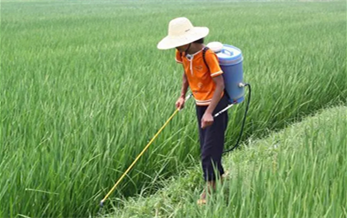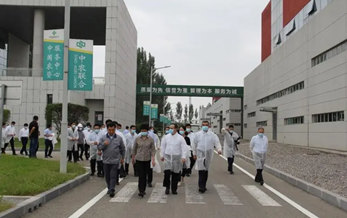france has published the second version of its national action plan, reconfirming its ambition to cut pesticide use by 50% over the course of a decade. the recently published ecophyto ll pledges an extra €30 million to help achieve this and outlines a raft of measures building on the first plan, which has its origins in france’s major stakeholder consultation on the environment in 2008.
in this report:
1. acting today to change agricultural practices
2. improving knowledge and tools for the future and encouraging research and innovation
3. evaluating and controlling risks and impacts
4. speeding the transition to pesticide-free gardens, green spaces and other infrastructure
5: public policy, territories and chains
6. communications and establishing simplified governance
these measures seek to reverse a national trend which has seen a slight increase in the use of synthetic plant protection products despite recent efforts to boost more sustainable approaches.
ecophyto ll is based on seven principles which translate into six areas for action, comprising a broad range of measures including tasks such as changing practices and systems, and boosting research, development and innovation. these measures address all possible pesticide users, ranging, for example, from a study into the possibility of compensating farmers for economic losses engendered by changes in practices to a ban on self-service and internet sales of pesticides to amateur gardeners (the latter will not be able to use chemical plant protection after 2019).
the seven principles of ecophyto ll are:
1. maintaining the aim of a 50% reduction in pesticide use in two stages: a reduction of 25% by 2020, based mainly on optimising production systems and the transfer and dissemination of currently available solutions, and a 50% reduction by 2025 thanks to profound changes in production systems and chains, supported by political decision makers in the medium and long term, an ambitious training policy and scientific and technical advances.
2. 360° monitoring of impacts: ecophyto ll makes it clear that all risks associated with plant protection products (for human health - not limited to users - and the environment) must be monitored and considered in a comprehensive and thorough manner.
3. being at the heart of france’s agroecology project: ecophyto ll notes that the objectives of a reduction in the dependence, risks and impacts associated with pesticides puts it firmly at the heart of france’s agroecology project, which concerns stakeholders in all production chains and territories aiming for systems which offer economic, environmental and social performance.
4. putting farms at the centre of the plan: ecophyto ll will focus significantly on levers which promote changes in practices on the farm, taking into account the factors which effect pesticide use at this level (choice of cropping system, crop sequence or rotation, organisation of labour, equipment available, determinants of economic performance etc.) and providing the farmer or farm manager with the capacity to choose the appropriate development path.
5. team work: group dynamics will be important in ecophyto ll and it will give preference to supporting actions conducted at larger scales than the field or farm, and to production chain projects.
6. territorial approach: ecophyto ll identifies the regional level as being particularly strong for offering guidance and ensuring implementation. action can be strengthened by paying particular attention to issues relating to pesticide use, risks and impacts in all regional strategies and action plans.
7. adopting a positive attitude: the plan notes that developing agricultural production systems and the management of open spaces based on synergies between agronomy and ecology is a positive and modern challenge, based on technical progress and the mobilisation of all stakeholders. it says the awareness of all citizens will be essential for the transition of french agriculture towards systems offering economic, environmental and social performance.
these, then, are the principles on which the plan is built. so what are the actions planned? actions are divided into six themes and below we outline these with some examples of what they will entail:
1. acting today to change agricultural practices
this broad category of actions will work in concert with existing public policies such as france’s ambition bio 2017, which encourages organic farming, and some parts of the common agricultural policy, notably agro-environmental and climatic measures.
the first task is to encourage farmers to adopt practices leading to less pesticide use, for which ecophyto ll plans a three-pronged approach, including an experimental certification scheme (known by its french initials, cepp) for economic pesticide use. this will be similar to schemes used for energy use, for example, and will be obligatory for pesticide distributors, who will have to support the on-farm introduction of measures known to reduce the use, risk and impact of pesticides. failure to do so will result in financial penalties. experimentation will begin on july 1, 2016, and run for five years.
there will also be support for the introduction of the latest-generation agricultural equipment (including a listing of machinery offering the greatest environmental added-value) and decision support systems (dss), with special attention paid to dss which can take into account factors beyond the field scale.
biological control will be further developed and promoted, with the dephy expe experimental network and the dephy demonstration farm network being used to present and spread the integration of innovative or emerging biocontrols in cropping systems. support will be given to the development of biocontrol solutions not only in those sectors with high levels of pesticide use but also for minor uses and to identify biocontrol solutions for which there are currently few options, such as weed control.
greater use is planned of the dephy demonstration farm network, which will grow to 3,000 farms, with measures including boosting the number of demonstrations, integrating the farms of agricultural colleges, increasing the number of organic farms in the network and ensuring the network covers all crops and all areas of france. relations with downstream sectors will be strengthened to spread awareness of the network to retailers and consumers.
experimentation is vital, says the plan, and the work conducted and launched during ecophyto l, the dephy expe experimental network and the exploitation and dissemination of results will be strengthened.
ecophyto ll plans a 10-fold increase in the number of farmers making the transition to agroecological approaches with a minimal use of pesticides. measures to reach this total (30,000 farms) include the creation of a new training course for advisers and innovative tools for knowledge transfer, including the development of the ecophytopic [link] ipm portal (run by endure partner acta).
greater use is planned of the country’s plant health bulletins, which currently disseminate news of pest pressure from more than 3,500 observers monitoring more than 15,000 fields to farmers and advisers. known by their french initials bsv, these bulletins will become ‘vectors for information’, presenting alternative methods whose efficacy has already been proven.
given the high proportion of herbicide use in france’s overall pesticide consumption, weeds are being monitored from this year and the bsvs will encourage all farmers to systematically monitor weed presence in their fields, a task which will be made easier by the production of new learning material for weed identification.
ecophyto ll wants to boost the predictive capacity of the bsvs and will be exploring which epidemiological models are best suited to this task. it emphasises that the interpretation of these models (which may require further training) is an essential lever for reducing fungicide and insecticide use in crops where current usage is high, such as grapevine, pomefruit and potato.
the new plan also seeks to boost initial training and increase professionalism, not only in those applying pesticides but also among advisers and distributors and changes are planned to the certification system currently in place. for agricultural students, new courses are planned, integrating agroecological approaches.
2. improving knowledge and tools for the future and encouraging research and innovation
ecophyto ll notes that research, alongside training and development, is key to changing france’s agricultural economy and is already strongly involved in meeting the plan’s challenges, going way beyond purely agronomic issues. these efforts will be reinforced in ecophyto ll, with studies on environmental and health impacts and the launch of research and development programmes with a strong operational focus.
a national strategy for research and innovation is to be created to identify priorities and a new research and innovation scientific steering committee will be responsible for defining, leading and implementing this work. the national strategy will include a roadmap based on four objectives:
•
guiding and supporting research to promote ipm, limiting the dependency on pesticides, reducing the risks and impacts associated with their use, identifying and addressing socio-technical and economic barriers to changes in practices and supporting changes in practices and in supply chains.
•
increasing multidisciplinary research into the environmental and health risks and impacts relating to pollution of the environment (air, soil and water) associated with pesticides.
•
developing research to support the prohibition on the use of pesticides in gardens (from 2019), green spaces (public green spaces from 2017) and other infrastructure.
•
improving the links between pure research, applied research and innovation in all areas covered by the plan and promoting the networking of research with different stakeholders.
the plan foresees research efforts at both the european and national levels, with france continuing to play an important role in the creation of a strategic european research agenda (through c-ipm and endure) and national calls for projects. the latter comprise:
•
sector-specific research and development programmes with a strong operational focus addressing the major levers for reducing and improving pesticide use: biological control, agricultural equipment (including robotics) and individual protective equipment, varietal innovation and sustainable management of weeds, and technical substitutive solutions in gardens, green spaces and other infrastructure.
•
research on the design, testing and development of effective alternative techniques in terms of their economic, environmental and social performance.
•
research on ipm, agroecology, changes in working practices and procedures, supporting stakeholders and socio-technical and economic constraints.
•
research on evaluating and reducing risks to the environment and human health from the use of pesticides.
naturally, ecophyto ll includes plans for the exploitation and dissemination of research results, both to those working in the field and decision makers, including through the use of ecophytopic and through partnerships with agricultural schools and universities.
3. evaluating and controlling risks and impacts
ecophyto ll makes it clear that at the heart of the plan is a desire to reduce the risks linked to pesticide use for human health (with priority given to users, neighbouring populations and vulnerable populations), the environment and biodiversity.
one aspect of this approach is the creation of a surveillance system which will monitor for undesirable effects on humans, livestock, honey bees, crops, biodiversity, wild fauna, water and soil, air quality and in food products. to reduce the risks associated with pesticide use, the plan proposes increased support for evaluating risks (including new tools for understanding chemical risks), substituting pesticides which carry particular health risks (such as endocrine disrupters) and encouraging innovation in the design and implementation of safer spraying equipment.
greater use is to be made of indicators for use, impact and changes in practice, including the development of three indicators widely used in france: nodu (number of dose units), qsa (quantity of active ingredients sold) and tfi (treatment frequency index). nodu and qsa will be broken down according to the modes of action of products (herbicide, fungicide, insecticide, acaricide etc.) and their category (biocontrol, low risk, for use in organic agriculture etc.). tfi will undergo work to provide a tfi of active ingredients. work is also planned to produce indicators for changes in practices, for example, the use of dss, crop rotations and cover crops.
finally on this theme, the plan envisages speeding up the withdrawal of active ingredients which are known to be dangerous to human health and biodiversity and a review of approval procedures and greater efforts to control fraud (estimated to be between 2.5% and 5% of the french market) and violations of the regulations.
4. speeding the transition to pesticide-free gardens, green spaces and other infrastructure
france has recently passed legislation encouraging the reduction of pesticide use in domestic gardens and urban green spaces and ecophyto ll will support the changes underway through, for example, establishing and disseminating a list of biocontrol products, developing vocational training on alternative methods and engaging stakeholders in the dissemination of alternatives.
5: public policy, territories and chains
ecophyto ll plans to increase regionalisation, encouraging local collective dynamics around the shared objective of reducing pesticide use and risks. regional prefects provide regional governance and will continue to lead structural measures and ensure their development in line with new national guidelines.
each region will be expected to provide a regional roadmap in line with regional plans for modernising farms and rural development. these maps will take into account local specificities such as the diversity of production systems, environmental and plant health conditions, and may target priorities such as zones particularly sensitive to health or environmental risks which have been identified in existing planning documents.
based on the principles of ipm, identified in the european directive 2009/128/ec, a frame of reference for integrated protection will be drawn up with partners (notably technical institutes) to establish common benchmarks in the design and implementation of actions aimed at sustainable pest management.
this will then be adapted to the diversity of local production systems, environmental and phytosanitary situations. this will be a central tool for all farmers and green space managers, and highlighted at the european level so it can be shared as widely as possible, and can be used as a reference in establishing contracts and international trade agreements.
work will continue on france’s ipm portal, ecophytopic, including the development of a collaborative module and greater exploitation of the resources developed in other parts of the plan to strengthen the systems approach already in place.
ecophyto ll contains a number of actions dedicated to encouraging and supporting regional and sectoral collective projects. it says preference will be given to actions implemented collectively for the reduction of pesticide use, particularly if they go beyond the farm scale or mobilise different actors in a chain. a systems approach will be encouraged to develop cropping systems and business models which are more robust and resilient.
the further development of organic agriculture (already supported by the €160 million per year ambition bio programme) will also be encouraged, particularly for arable crops. the plan notes that crop diversification also concerns organic farmers and techniques used for crop protection in organic production will be highlighted as technical references.
a study is also to be conducted (building on work conducted in 2011) to quantify the economic risks linked to the adoption of new techniques. bringing together public authorities, researchers specialising in agricultural risk management, insurers, accountants and those working in the sector, it will seek to establish needs and possibilities for risk coverage.
france does not consist of only the mainland and its overseas territories provide the country with europe’s only tropical agricultural systems! these provide a particular challenge and ecophyto ll presents specific measures for tackling them, including greater regional cooperation.
6. communications and establishing simplified governance
the wide dissemination of the tools and actions implemented under ecophyto ll is planned, with communication highlighting the modern and positive nature of the challenge of reducing pesticide use, risks and impacts. as the plan evolves and adapts in real time, the monitoring indicators for pesticide use and impact and changes in practices [see point 3] will be communicated to the public. the european level will be tackled through benchmarking and the promotion of french initiatives, including highlighting france’s position in building the new european plant health strategy.
raising awareness is important to the plan, both amongst farmers and consumers and, indeed, between the two groups. consumers will need to be informed about farmers’ commitments to ‘produce differently’ and encouraged not to be too particular about the visual quality of produce, while farmers will need to be aware of consumer expectations on the health quality of products (pesticide residues).





